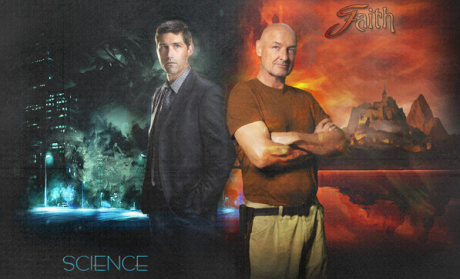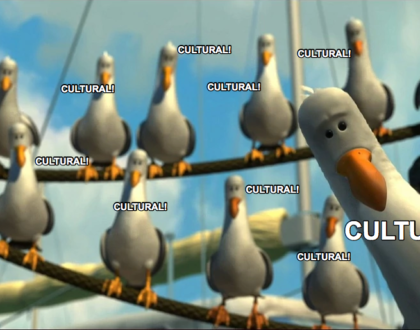Science vs. Faith?

by Bubba
Do you think it is possible to square Biblical events with science?
I was speaking with a few European brainiacs (and atheists) over beers in NYC in January on the topic of Faith vs. Science. Andy proposed that the Scientific discipline is one which states Anything not Disproven is Possible while the Faith discipline is one which states I Believe, Even If I Know It is Not True placing the two paradigms in a nullifying juxtaposition so that they can not coexist. I asked the three of them whether they considered me a man of Science or a man of Faith, to which one of them stated (and the others laughingly agreed), “You are some weirdly successful Scientific man of Faith that we do not understand.“
I pointed out that while I agree with the statement Anything not Disproven is Possible, I do not agree with the definition of faith involving a belief in something known not to be true. Conversely, I subscribe to a definition of faith as Belief in that which I am Convicted is True. This provides a great union of Science and Faith. To which the typical challenges rear their heads, they asked, “So how can you accept the Biblical account of Creation, which obviously isn’t possible?” and then waggled their eyebrows over the tops of their pints at each other, quite convinced that they had my king and queen in a bishop skewer that would result in checkmate in less than five moves!
There was a time when the brightest scientific stars had proven that the earth was not round, anyone who dared believe the earth was round was absurd and at best a fool! There was also a time when heavier than air flight was scientifically proven to be impossible, only the crazy would argue otherwise. It was simple absolute fact, the earth is flat, you can not fly, and gravity is a law! In both cases, some few individuals determined that neither had been adequately disproven, and ultimately, to the dismay of those who held the position, the few went on to prove the majority (of very intelligent, educated, diligent, wise, scientific men) to be utterly wrong. In retrospect, we view those who turned out to be wrong as foolish, small minded, and absurd; however, back in the day they were just like you and I, leaders of their fields and it was the men who proved to be correct who were then viewed as foolish, small minded, and absurd.
History continually repeats this lesson, and some of those we view as the greatest scientific pioneers are the one who repeatedly persevere in the face of mounting proof that they are wrong. Thomas Edison, “I didn’t fail. I just found two thousand ways not to create a light bulb.” However, by our ever present standards, once he hit the few hundred mark many would say “It can’t be done.”; and somewhere around a thousand failed attempts people would suggest the possibility has clearly been disproven, at two thousand attempts only the foolish would continue to believe it possible.
So then, has the biblical account of creation been sufficiently disproven such that one should not believe in it? You might believe so, but I do not. Most especially if we (and I do) presuppose an Almighty, Sovereign Creator that exists outside of creation. There is nothing in Scripture nor Science that prevents me from theorizing that said Creator did this work over the course of six twenty four hour periods and rather than creating everything with an age of (0 + Y) where Y=Time Since Creation. Put another way, we haven’t proven that He didn’t create “old” things. That is to say that the planet has only been in existence for 1 hour, but it was called into existence at an age of X where X=Age When Created, complete with coal deposits,evidence of continental drift, and fossilized bones buried in the rock and frozen in the northern wastes.
In this theory, the evident, scientific age of the planet would be X+Y. The creation account of man (Genesis 1:26-29) leaves plenty of room to infer that God created Adam and Eve as “adults” rather than children that grew into adulthood, to the degree of creating them with a working knowledge of communication, language, and speech. If man is indeed a (if not the) high point of Biblical Creation, it certainly doesn’t seem far fetched from a Faith perspective to theorize in such a way. Keeping in mind that Scripture doesn’t explicitly teach this, and I’m not proposing this is the way it happened but rather stating that it seems reasonable that this could happen, presupposing an Almighty Sovereign Creator.
Scripture is not a scientific textbook meant to explain in scientific detail precisely how any given phenomenon works, I do not expect to find an algorithm that solves string theory within it’s books. I do believe that Scripture necessarily deals with the physical world, and that my Creator is the author of that world and the logic that dictates its governance. So, where Scripture and Science cross paths, and I see a place where some current scientific body of knowledge appears to be at odds with Scripture, I remind myself of a time when cloning was nothing but science fiction and presuppose Scripture and Science will no longer be at odds once we have worked through the ways NOT ultimately find that we can indeed create a light bulb.
Why Do You Accept It?
If I meet a stranger the first time, we have no introduction and know previous knowledge of each other, I will extend some small initial amount of trust to this individual, and will spend some portion of our budding relationship evaluating the trust I have with the individual. In short, I’m not likely to confide my deepest anxieties and secrets with this individual I’ve only known for a minute or two.
On the other hand, I trust Tracey, my wife of many years, with everything and I trust Tommy, by best friend, with most everything, and I trust my brother Scott in the same way. If Tracey, Tommy, and Scott all approach me and say, “We want to introduce you to Skeeter. Skeeter is a reliable man of character and great trustworthiness. You can trust him Bubba.” I’m most likely going to transfer a significant amount of initial trust to Skeeter, sight unseen.
I have discovered Scripture to primarily be about my relationship with God, secondarily about my relationship with my wife, followed by my relationship with my immediate family, then my spiritual family (fellow believers), and finally everyone else (non-believers). It is about how one goes about the practical aspects of living life, particularly a life that glorifies God and is full of enjoyment.
To this end, I have a relationship with God, which is then presupposed in all aspects of my life, to include analytical, critical, scientific inquiry. I appreciate that many do not enjoy said relationship, and further to that, fewer still are willing to persevere through thousands of proofs to find the final one. However, given my relationship with my Creator and the increasingly evident proofs in my own life that Scripture is indeed spot on in the multitude of areas that it intersects with all of my life; I transfer an utterly unwavering trust to those areas that I have yet to see scientific proof of.
Recommended Posts

Cultural or Not
October 04, 2017

Children Are A Blessing
October 03, 2017

Halloween
September 26, 2017
Well written.